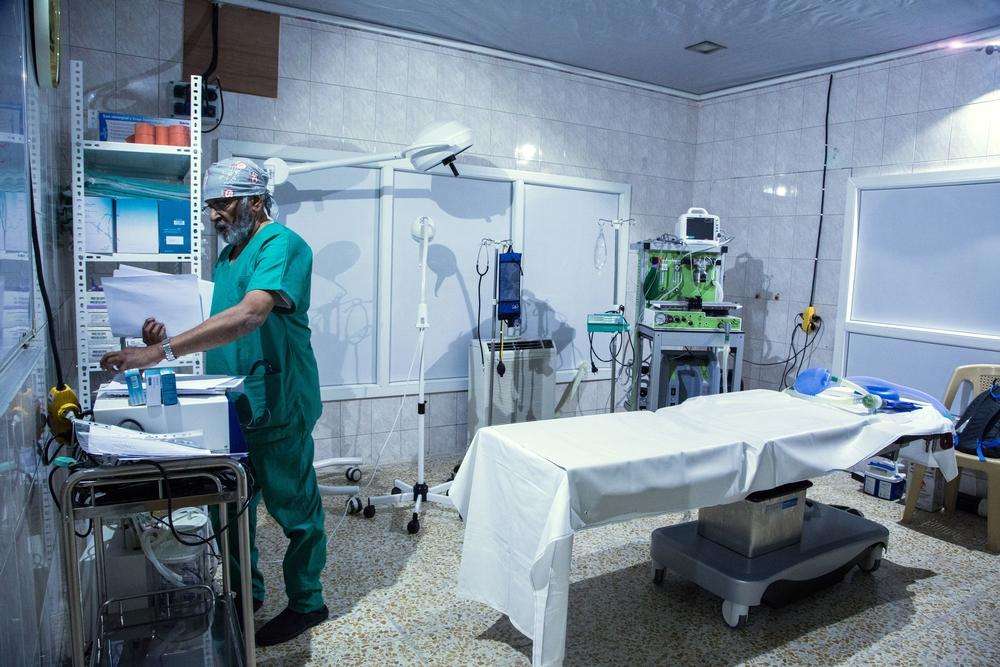On February 19, Doctors Without Borders/Médecins Sans Frontières (MSF) opened a field trauma hospital with surgical capacity in a village to the south of Mosul. It is composed of two operating theaters, one intensive care unit, an emergency room, an in-patient ward, and other necessary support facilities. The MSF team working in the hospital—composed primarily of Iraqi surgeons, doctors, and nurses—only has the capacity to operate on the most severe life threatening cases, known as "red cases." The less sever case that can wait are stabilized are referred to other hospitals in the region, known as "yellow cases."
Since opening, the facility has received more than 915 patients. Of these, 763 suffered war related trauma, 190 of whom were red cases and 421 of whom were yellow cases. More than half of the wounded were women and children under the age of 15.
On March 18, two MSF surgeons, Dr. Reginald Moreels and Dr Ahmed*, described their experience working in MSF's field trauma center.
Dr. Reginald Moreels, a 66-year-old Belgian surgeon, spent six weeks working at MSF's field trauma hospital south of Mosul. On his last shift, he describes this assignment as the toughest situation he has experienced during his long MSF career.
I’ve been through many other wars—Syria, Liberia, Angola, Cambodia—but I’ve never seen something like this. In the operating theater every case we receive is severe and almost every day we have to deal with mass casualties.
Our patients can be of any age, any gender, and suffering from any sort of war wound: sniper attack, mortar shelling, airstrike, landmine, and other explosions. They all put their life at risk to flee a city under siege.
Yesterday, the weather was bad—grey and cloudy with some rain—so we received only 20 war wounded patients. But when weather conditions are good we receive huge influxes of wounded men, women, and children. When it’s cloudy or rainy we receive less people. Now, we look at weather forecast to best prepare ourselves and to anticipate mass casualties.
On one sunny afternoon, the ambulances started to arrive, one after the other. Usually the stabilization posts close to the fighting alert us when they are referring stabilized patients to our center. But that day, due to the chaos, it didn’t happen.
It was really tough. We had to transfer some of them because we didn’t have the space to treat everybody, but alongside the Iraqi doctors and nurses we worked around the clock. It was sunny but we never saw the sun as we operated on one person after another until five in the morning. At the end we had received around 100 patients, we were exhausted. We have since opened a second operating theater to increase our capacity.
As I finish my six week assignment, I’m shocked by the number of families devastated by this war—mothers and fathers begged us to save their son or daughter as they were the only family members left alive. I’m impressed by the strength of the Iraqi people and by the generosity and hard work of our Iraqi colleagues—we could do none of this work without them.
Read More: Iraq: Thousands Fleeing Western Mosul with Acute Medical Needs
Dr. Ahmed* is an Iraqi orthopedic surgeon who began working for MSF in 2008. Since mid-February, 2017, he has worked at MSF’s field trauma hospital south of Mosul.
Yesterday morning we received a family of four: a mother, a father, and their two small boys. They had all been wounded by a mortar grenade. The mother and father had already died so we worked around the clock on the two brothers. The head wound of the smallest boy was too severe, so he passed away. We only manged to save the nine-year-old brother. I wonder how he will survive—from his whole family, he is the only one left.
Yesterday afternoon, we received another boy, this time a ten-year-old. He arrived with his left leg almost amputated by a mortar shelling. We went straight into the operating theater but he lost a lot of blood on the way to our hospital. For two hours we did orthopedic surgery, then my colleague did a laparotomy for another hour, but during the night he died.
We try to do everything we can, but sometimes it’s not enough. If I could, I would take a picture for each of the patients I treated to tell their stories and to remember them. Here I operate only on red cases but I would like to do more. I’d also like to follow the yellow cases, the ones we refer to other facilities. I would like to take care of them, to do all I can to help these people who have been through such terrible suffering.
*Name has been changed
Since the start of the military offensive to recapture Iraq's second-largest city in October 2016, MSF teams have been increasing medical and humanitarian assistance in Ninewa governorate, working alongside Iraqi health staff to ensure the population has access to emergency medical care, including mother and child care. In Iraq, MSF relies on more than 1,600 international and Iraqi staff for its medical and humanitarian work in 10 governorates. To ensure its independence, MSF does not accept funding from any government, religious committee or international agency for its programs in Iraq, relying solely on private donations from the general public around the world to carry out its work.




